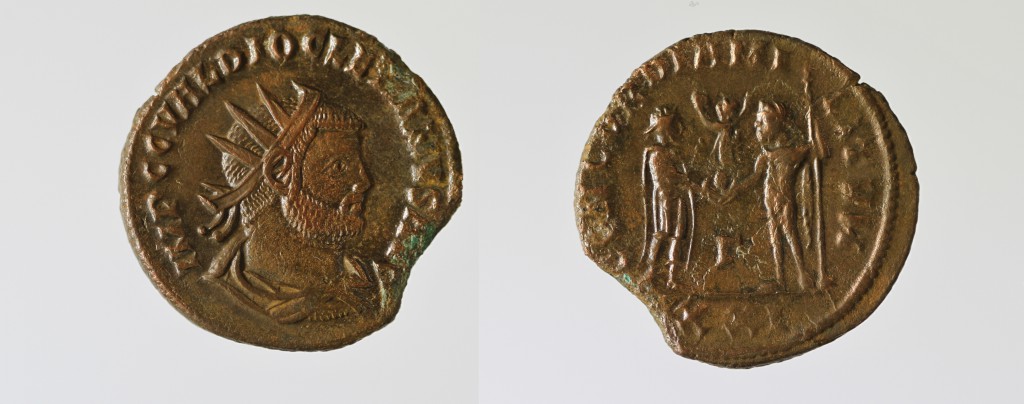November 20, 2015, by Will Leveritt
On this day in AD284 Diocletian became emperor
Text by Benedict Segal
Image by Sarah Jordan
On this day in AD 284, Gaius Aurelius Valerius Diocletianus (known to us as Diocletian) acceded to the throne of the Roman Empire.

AE Follis of Diocletian. Obverse has radiate, draped bust of the emperor right, IMP CC VAL DIOCLETIANVS PF AVG. Reverse has Emperor facing right receiving Victory from Jupiter facing left holding a sceptre, CONCORDIA MILITVM / GAMMA / XXI. 20mm, 3.59g, 12 o’clock. RIC V 284v, G. Numismatic information by Rob Stone and Olivia Webster.
Before becoming emperor, Diocles (for this seems to have been his birth name) had been a successful leader in the military field: he had, for instance, guarded the borders of the empire on the Danube as dux Moesia, eventually rising to become head of the protectores domestici (the imperial bodyguard) under the emperor Carus (AD 282-283). In this role Diocles was probably with Carus during his campaign against the Sassanids.
The successful campaign was cut short by Carus’ sudden death (from a lighting strike, say some sources); his sons Carinus and Numerian jointly succeeded him. Carinus, in Gaul at the time, went to Rome and was officially proclaimed emperor. In Bithynia, during his own journey back from the eastern front, some members of the Roman army found Numerian lying dead in his litter.
Following this grim discovery, on 20 November AD 284, Numerian’s generals and military advisers called a council for the succession, and chose Diocles as emperor. Shortly thereafter he changed his name to Diocletian.
The cause of Numerian’s death remains unclear, but the one put forward at the time by Diocletian and his supporters was that Aper, who was both the prefect of Numerian’s Praetorian Guard and his father-in-law, had murdered him. It did not help that Aper was the one who reported the death, as by doing so it seemed he might have had something to do with it; but in reality Numerian almost certainly died from natural causes.
Whatever the truth, Diocletian had been presented with an opportunity to remove a serious rival for the imperial throne. Diocletian thus accused Aper and, we are told, killed him personally before his troops. Strangely, a prediction is said to have been made to Diocletian that he would become emperor on the day he killed a boar. In Latin the word for boar is aper.
After formally being acclaimed emperor, Diocletian possessed real power only in the eastern portion of the empire. The West was obedient to Numerian’s brother Carinus. However, a year later Carinus, who seems not to have been a popular ruler, was killed by his own troops at The Battle of the Margus. Thus in 285 Diocletian became sole emperor, though he would go on to develop a four-man system of government – involving two senior emperors (the Augusti) and two junior emperors (the Caesares) – which we call the Tetrarchy.
The accession of Diocletian represents a key moment in the history of the Roman Empire in another way. The early empire of Augustus and his successors was an absolute monarchy hidden behind a republican and egalitarian facade, including the idea that the emperor was merely primus inter pares (first among equals); but Diocletian established a new style of rule: an absolute and authoritarian monarchy, stripped of these republican fictions, in which the emperor was separated from and placed above his subjects – a quasi-divine autocrat.
No comments yet, fill out a comment to be the first

Leave a Reply